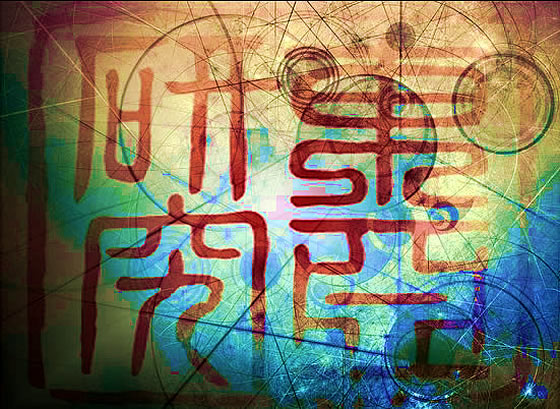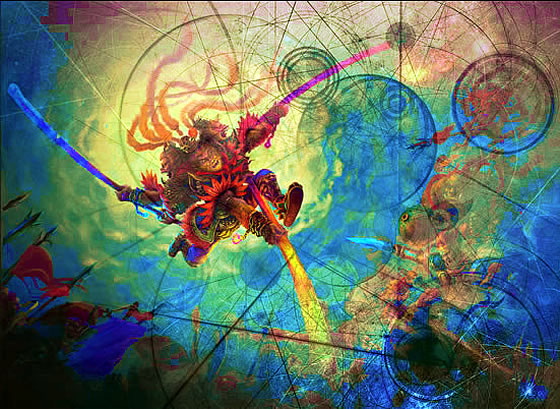

Rodan sat next to her foster mother on the long sofa in Mai Li Tuo’s Chinese drawing room. Dinner was over and Li had just brought a fresh pot of fragrant green tea. He poured first for Kristoph, his oldest friend, then for Marion and Lily. Rodan’s grandfather was next, and then she accepted a cup.
“We were going to hear stories,” she reminded her surrogate grandfather as he sat back with his own cup of tea from the beautiful pot with a Chinese dragon winding itself around from handle to spout.
“Indeed, we are,” Li answered. “But who will tell one first? And will it be long or short?”
“The shortest story ever written,” Kristoph remarked with a wry smile. “The last man from a dying species was sitting alone in his room when he heard a knock on the door.”
Rodan squinted with puzzlement. The men all smiled knowingly. Marion laughed out loud.
“It was the last two WOMEN inviting him to a party.”
Everyone laughed, as they were meant to do.
“Your turn,” Kristoph told his wife.
“Oh, dear,” Marion sighed. She remembered for a moment, a time when the very idea of being asked to entertain others in that way would have turned her into a stammering wreck. She had much more confidence in herself now, but thinking up stories on the spot was difficult, still.
“Well, there is one… it’s not mine. It was in an anthology I read once, years ago, but it’s a good one.”
She took a deep breath before telling.
“A famous science fiction writer had won an award and he was enjoying a celebratory dinner with his friends. ‘Mike,’ said one of them. “How do you think up such great ideas? You invent whole planets full of fantastic alien beings. What an imagination.’ Mike smiled mysteriously. ‘One day I was sitting at my desk, thinking, and I imagined a savage, terrible planet, a nightmare of a place. And as I did so, I felt as if the planet had popped into existence, just by the power of my mind. So then, I imagined the savage planet was populated by a terrible, monstrous people, so frightful to look at they’d make you sick. They were cruel and warlike. They committee dreadful atrocities that frequently went unpunished. And again, as I thought of them, it was as if they popped into existence. Then I thought, what if I could go there. What if I could look like them and live among them, observing them from within. And suddenly I was there, looking as ugly and frightening, monstrous as they were, living among them, eating the sickening food, living the savage life. And the trouble was, I hadn’t left myself a way out. I was trapped there, with those awful creatures.’ Mike paused. His friends looked at him expectantly. ‘Come on,’ they insisted. ‘How did you get home? You must have.’ Mike looked back at his friends and sighed piteously. ‘No,’ he said. ‘I never found a way.’”
There was a long pause as the last line sunk in. Then a gasp of understanding and a round of applause.
“China must have its moment, now,” Li said.
“The Monkey King,” Rodan suggested. “You told me that story when I was little.”
“Yes, I did,” Li admitted. “The Monkey King… or Sun Wukong, was born from a magic stone that sat atop the Mountain of Flowers and Fruit… known to all as Mount Huaguo. He was a stone statue of a monkey at first, but then he came to life with glowing golden eyes and mischief in his heart. At first he was king only of the other monkeys of the mountain, but as time went on he became more powerful. He captured the mystical golden staff, Ruyi Jingu Bang, treasure of Ao Guang, the dragon-king of the Eastern Seas. It was said that upon Sun Wukong's approach, the staff glowed to signify it had found its true master. It could change its size, multiply, and fight according to its master’s whim. When not wielding the weapon, Sun Wukong shrank it down to the size of a sewing needle and tucked it behind his ear.
“With Ruyi Jingu Bang, Sun Wukong was able to defeat the dragons of the four seas in battle and forced them to give him a golden chain mail shirt, a phoenix-feather cap and cloud-walking boots. With them he returned to the Mountain of Flowers and Fruit and became more powerful, holding all of the beasts under his thrall. He lived a long life, far longer than any other monkey. When he died, Sun Wukong defied Hell's attempt to collect his soul. Instead of reincarnating, he wiped his name out of the Book of Life and Death so that he could be immortal. When they found out The Dragon Kings and the Kings of Hell reported his behaviour to the Jade Emperor.”
“The Jade Emperor tried to bring him to heel, but he defied the Emperor’s authority. He consumed Xi Wangmu's Peaches of immortality, Lao Zi's pills of longevity, and the Jade Emperor's royal wine, then escaped back to his kingdom.”
“Sun Wukong single-handedly defeated the Army of Heaven's 100,000 celestial warriors, all twenty-eight constellations, four heavenly kings, and Nezha, and proved himself equal to the best of Heaven's generals, Erlang Shen. Finally, the Bodhisattva of mercy, Guanyin, captured Sun Wukong. He was locked into Lao Zi's eight-way trigram Crucible to be distilled into an elixir by samadhi fires. After forty-nine days, however, when the cauldron was opened, Sun Wukong jumped out, even stronger and now able to see through the souls of men and see their deceit.”
“The Jade Emperor and the authorities of Heaven appealed to the Buddha who came from his temple in the West. The Buddha bet that Sun Wukong could not escape from his mighty palm. Sun Wukong accepted the bet confidently. He leapt and flew to the end of the world. Seeing nothing but five pillars, Sun Wukong believed he had won the bet. He marked the pillars with his Monkey King symbol and leapt back to the Buddha's palm. He was surprised to fi)nd that the five "pillars" were in fact the fingers of the Buddha's hand. His bet was lost. Sun Wukong still tried to escape but the Buddha turned his hand into a mountain and sealed Sun Wukong under it for five centuries with a Holy Mantra.”
Rodan clapped as the story ended.
“When I was little you used to tell the story differently. You told me that the naughty Monkey King had a wee on the Buddha’s fingers.”
“That is a version to make little girls laugh. But you are old enough, now, to know how rude that is.”
“Yes,” she agreed. “Who next to tell a story?”
“I will,” Lily answered. She settled herself nicely and began a story that Marion had heard for the first time when she travelled to Gallifrey. It was the story of Lucio and Andanna, a love story worthy of Shakespeare. Lucio Gorta went to war for Gallifrey. When he returned, after a long, difficult campaign, his sweetheart, believing him dead, had gone to the Sisterhood of Contemplation. She was about to make unbreakable vows of Dedication. If she made the Vows she was dead to society and Lucio would never be able to see her again. He had no choice but to travel across the Great Plain to the House of Contemplation and beg her to change her mind. It was five hundred miles and high summer. Everyone told him it was impossible, that he would die of thirst and exhaustion, but nothing would stop him. He took no food, but as much water as he could carry and set off on his journey. The sun beat down by day and the cold stars mocked him by night, but he kept going. He didn’t sleep. He didn’t eat. He drank only enough water to keep from dehydration. Finally, after many terrible weeks of hardship he reached the House of Contemplation and knocked on the great, closed door. By the time the Sisters drew back the many bolts and opened the door he lay, near death, on their threshold.
“From there, the story is told many different ways,” Lily said. “In some versions he is too late. She has taken her Vows and he turns to cross the plain again, but, broken hearted, dies on the way. In another he lives just long enough to look upon his sweetheart and then he dies in her arms. Then she either takes her unbreakable vows or starves herself to death and their bodies lie side by side on the funeral pyre amidst the grief of their two families.”
“Shakespeare would choose that version,” Marion noted. “But I think I prefer the happy ending.”
“I agree,” Lily said. “Yes, in that version the Sisters brought the exhausted man into their care. He wakes a week later, thinking he is too late, but, of course, Andanna only came to the Sisters because she thought him dead. When she heard the news she waited by his side and they returned home together to be married and live on in happiness.”
“Much better,” Marion agreed.
“Of course, there is the version where the Lady thought all was lost so she married his school friend instead and when he came home from war he gallantly wished her every happiness,” Lily added quietly while glancing at Kristoph.
“And you have always been happy, Lily, my dear,” Kristoph replied. “And I have been happy for you. But we are telling stories tonight, not dwelling on real life. Rodan… Do you have a story to tell?”
“Yes, I do,” she said. “I wrote it for a competition at the community centre. Miss An Li said it was a very mature composition. But I can tell it from memory, too. Grandfather can tell it with me. He can start and I will continue it.”
Arges Mielles smiled proudly at his granddaughter and began the story she had written down, but which truly belonged in the oral tradition of the Caretaker class of Gallifrey just as the Monkey King was a part of the oral tradition of China
“Once, a young girl climbed a hill,” he began. “At the top she found an old man who was reading aloud from a big, leather bound book. His stories were fascinating so she sat and listened for hour after hour. There were stories about war and stories about peace, stories of heroism.”
“’Time to go home, little girl,’ the man said as the sun began to set. ‘But you may listen to more stories again tomorrow.’”
“So the girl did as he said. The next day she listened to stories of great quests, of great danger and great challenges to overcome.”
“And again, and again there were stories of love and devotion, stories of duty and honour.”
“Every day the girl wondered if the old man would ever run out of stories. But the book was less than halfway and it never seemed as if it got any closer to the end.”
“Indeed, it sometimes seemed to the girl, as weeks turned to months and months to years, that the book got thicker, filled with stories of good kings and terrible, cruel tyrants, of brave men and courageous women who fought the tyrants.”
“And the years passed with many more stories of adventurers who crossed deserts or sailed great oceans, who climbed mountains or explored deep caves that went into the depths of the ground.”
Arges paused. Rodan smiled at her grandfather and took up the story from him.
“One day a young boy climbed a hill and found an old woman sitting there, reading aloud from a huge book. He sat and listened to the stories about war and stories about peace, stories of heroism, stories of great quests, of danger and excitement, stories of love and devotion, stories of duty and honour, stories of good kings and terrible, cruel tyrants, of brave men and courageous women, stories of adventurers who crossed deserts or sailed great oceans, who climbed mountains or deep caves.”
“And the stories never ended, the book never ran out of pages, because they were the stories of the infinite universe itself and the infinite worlds and the infinite races with their never ending stories of life itself.”
“And again,” said Argos Mielles. “They were the stories a grandfather told his granddaughter and she, in turn, told to her own children and grandchildren, for that is how stories have always been told.”
“Quite right,” Li agreed. “But it was Rodan who imagined the turn of the infinite universe as a book of stories. Such an imagination is a thing to be encouraged.”
Rodan smiled again, but shyly because she knew that such praise could lead to conceit, which was not becoming in a girl of her tender age, especially in company with so many of her elders.
But she was pleased, all the same.

 |
 |
 |